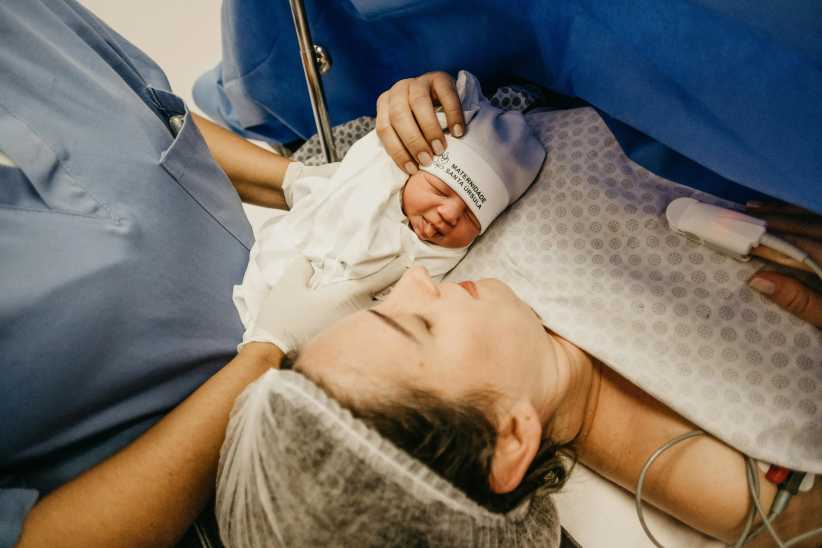 Although there are a fair number of home births in the United States, most women choose a hospital birth setting. More and more hospitals are trying to make the clinical setting feel less clinical. Beautifully painted walls, fine art, and comfortable linens are all nice selling points when you see them during your hospital tour, but are those things the most important? During birth class, most of the questions women ask me have to do with the surroundings in labor and delivery and not the more important questions which might help someone experience a better hospital birth. Let’s look at what a labor nurse might tell you.
Although there are a fair number of home births in the United States, most women choose a hospital birth setting. More and more hospitals are trying to make the clinical setting feel less clinical. Beautifully painted walls, fine art, and comfortable linens are all nice selling points when you see them during your hospital tour, but are those things the most important? During birth class, most of the questions women ask me have to do with the surroundings in labor and delivery and not the more important questions which might help someone experience a better hospital birth. Let’s look at what a labor nurse might tell you.
1. First and foremost, get to know your caregiver. We all envision a calm, safe birthing environment but it all begins with the right OB or midwife. If you haven’t had a conversation about your birth vision, you won’t know if your caregiver is on board with your preferences.
2. If you have a choice between two hospitals, tour them both. Sometimes it comes down to the hospital’s reputation, and sometimes it’s just a feeling. If the place has a good vibe, that might be good enough.
3. Are the people involved in your labor and birth supportive of your preferences? We love when family is around—most of the time. Your parents, siblings, and closest friends should be compassionate and accommodating to your choices. Have this conversation when nearing your due date. There is nothing more distressing to your birth nurse than when her patient is being bullied and browbeaten into someone else’s vision of what your experience should look like. For instance, if you decide to have an epidural and your family disagrees, you can politely ask them to go get something to eat or ask for “a few minutes of privacy.” If that doesn’t work, your nurse will usually be happy to intervene.
4. Ask your birth educator, your doula, and your caregiver about hospital policy and area standards of care. When laboring women come to the delivery room with a long birth plan, I sit with them and go over it line by line. Your RN will be able to tell you what is and is not possible in the hospital setting. Your birth instructor should know what is and isn’t an option as well. Knowing what to expect adds an extra layer of confidence in your team.
5. Understand your nurse’s role in the delivery room. We examine you for dilation, access your progress, and interpret the fetal heart rate monitor and your contractions. We administer your medication, mange your IV lines if you have them, and help you make decision about pain relief options. It’s your nurse with whom you will be spending almost all of your time. She is responsible for carrying out the doctor or midwife’s orders, advocating for you when necessary, and sometimes delivering your baby if it happens fast!
6. Your labor nurse may be taking care of two families. Ask your caregiver how the unit is staffed and what the nurse/patient ratio is in your hospital. Remember, a labor unit is a collaborative effort. A different nurse than the one assigned to you may come into your room to answer your call bell, examine you if your doctor asks, or take over while your nurse is on a break. Every mom is our patient. There is no “yours and mine” in this setting.
7. Does your OB allow intermittent fetal monitoring to allow for freedom of movement, eating, and drinking lightly throughout labor or the use of a saline lock (an IV that is capped off in case of immediate need) as an alternative to continuous IV fluids? These practices are fully supported by the Association of Women’s Health, Obstetric and Neonatal Nurses, the American Congress of Obstetricians and Gynecologists, and the American College of Midwifery. Remember, gravity is your friend! Ask for the least amount of intervention possible and when intervention is suggested, ask why. Knowledge is empowering. When you understand a procedure, only then can you make “informed consent.”
[gravityform id=”15″ title=”false” description=”false” ajax=”true”]
8. Hire a doula if you can. Ask around, talk to your friends and look on area websites. There are wonderful, caring, compassionate doulas in most communities. Interview a few doulas and look for someone who understands how hospitals work. If a doula tries to get between you and your caregiver, run! A labor doula’s job is to provide physical and emotional support to the laboring family—not to make any medical decisions. Sometimes the OBs or midwives have a list of doulas they feel comfortable working with or you can go to the DONA or CAPPA website to find doulas in your community. If your caregiver is reluctant, unsupportive, or dismissive, ask questions. The labor environment should be collaborative and supportive.
9. Is your hospital baby-friendly or, at the very least, able to provide full-time breastfeeding coverage? Ask your hospital labor and delivery director or tour guide if you can count on breastfeeding support from a certified lactation educator or consultant, and if so, ask if you can count on that same coverage on the weekends. Take a comprehensive breastfeeding class before birth—please! You’re going to be drained and having a tool chest of strategies for successful breastfeeding will give you a running head start. If you’re going to bottle-feed make it clear to the staff and ask for support. Your postpartum experience is part of your birth experience; it doesn’t end in the delivery room.
10. The most important tip for a better hospital birth is to be open minded. Yes, practicing relaxation techniques learned in class, birth ball maneuvers, and positions and postures for labor are all important preparation, but I can honestly say that the women who come into this experience with an open mind often have a much better birth experience over all—even when things don’t go as planned. Moms that can let go and allow the process to play out often have much less postpartum depression and an easier time breastfeeding, as well as a faster recovery.
Lizabeth Baker Wade RN is Labor and Delivery Nurse, birth doula, and birth educator. In 2002 she opened Birth and Beyond in Santa Monica, CA, and has provided birth education, labor doula services, and postpartum doula services for hundreds of new parents. For more information, visit birthandbeyond.net.






















